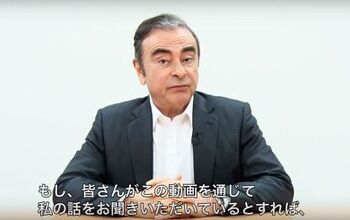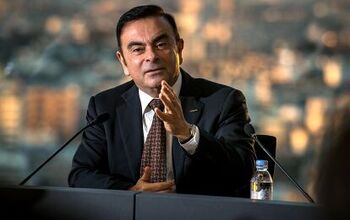Carlos Ghosn Re-released From Japanese Jail

The embattled ex-patriarch of the Renault-Nissan-Mitsubishi Alliance has posted an additional $4.5 million in bail. Beyond some new indictments regarding his alleged misappropriation of corporate funds, not much has changed regarding the case. Ghosn and his legal team continue to maintain his innocence, suggesting that Nissan orchestrated the entire ordeal as part of a industrial coup and further supported by Japanese courts that are perpetually hungry for convictions.
Unfortunately, everyone is making a pretty good case. The claims against Ghosn appear legitimate, but so do the accusations that Nissan’s entire investigation was primarily concerned with removing him from power. Similarly, Japan’s extremely high conviction rate and treatment of Ghosn have raised red flags in regard to his civil rights and whether he can expect a fair trial.
The court approved his release on Thursday morning and confirmed that Ghosn posted bail in the early afternoon, allowing for his release later that night. According to Reuters, his release was gently delayed by a failed, last-ditch effort by prosecutors to appeal the decision.
Some interesting stipulations are found in the bail agreement. Ghosn is to have no contact with his wife Carole, whatsoever, without prior permission from the courts, something he is unlikely to receive. Ghosn’s better previously claimed police didn’t even want her to use the bathroom without supervision after they re-arrested Ghosn at their apartment in Tokyo earlier this month on charges of aggravated breach of trust. She has been openly critical of his treatment within the country, frequently pleading to the French government for help. Carole Ghosn flew to Paris to do just that after her husband’s latest arrest on April 4th and, upon her return, was also questioned by the authorities.
The man himself, however, has been careful not to come across as unhinged or fearful. Instead, he’s tried to keep an open dialog with the public — a move made marginally more difficult by his latest arrest. Ghosn’s lawyer, Takashi Takano, says the former auto executive was subjected to almost 72 hours of questioning without legal representation present. While technically legal in Japan, the practice has come under scrutiny with Ghosn’s supporters — especially considering he’s already been arrested and questioned numerous times since November of 2018.
“I am grateful that bail has been granted and thankful for my family and supporters in Japan and around the world who fought for my release,” Ghosn said in a statement following his release. “No person should ever be indefinitely held in solitary confinement for the purpose of being forced into making a confession. But restricting communications and contact between my wife and me is cruel and unnecessary. We love each other very much, she answered all of the prosecutors’ questions in court, and she has done nothing wrong.”
Ghosn’s general communications will also continue to be restricted; any chatting he does engage in is expected to be closely monitored by authorities. A recent report from Automotive News explained that the court said this is being done to prevent him from fleeing the country (which seems like the best plan at this point) or tampering with evidence.
From Automotive News:
The latest indictment focuses on results of an internal Nissan investigation that found Ghosn approved payments of around $35 million from Nissan to a distributor in Oman from 2011 to 2018. The disbursements went to Suhail Bahwan Automobiles, which is run by billionaire Suhail Bahwan, a friend of Ghosn’s, according to someone familiar with the matter. The company distributes Nissan vehicles in the region.
Nissan’s probe found some evidence suggesting Suhail Bahwan Automobiles may have supported Ghosn’s purchase of a yacht and helped finance a company owned by Ghosn’s son.
Japanese media reports said that Ghosn paid Suhail Bahwan Automobiles out of his CEO Reserve, a special fund for ad hoc expenses. The disbursements were marked as marketing expenses, but prosecutors suspect they were channeled into personal use for such things as the purchase of a yacht and a 3 billion yen ($26.8 million) personal loan to Ghosn.
Renault, which ended up working together with Nissan on its internal investigation, is said to have notified French prosecutors that it uncovered suspect payments to a Renault-Nissan business partner in Oman when Ghosn was CEO. But Ghosn continues to claim innocence, suggesting the charges against him are “outrageous and arbitrary” and vowing he will not be broken.
[Image: Plamen Galabov/Shutterstock]

Consumer advocate tracking industry trends and regulations. Before joining TTAC, Matt spent a decade working for marketing and research firms based in NYC. Clients included several of the world’s largest automakers, global tire brands, and aftermarket part suppliers. Dissatisfied, he pivoted to writing about cars. Since then, he has become an ardent supporter of the right-to-repair movement, been interviewed about the automotive sector by national broadcasts, participated in a few amateur rallying events, and driven more rental cars than anyone ever should. Handy with a wrench, Matt grew up surrounded by Detroit auto workers and learned to drive by twelve. A contrarian, Matt claims to prefer understeer and motorcycles.
More by Matt Posky
Latest Car Reviews
Read moreLatest Product Reviews
Read moreRecent Comments
- DenverMike Yikes this used to a site for car enthusiast’s that would jump at the chance to get in on a little cannonball action, any excuse with the payoff of getting the hell out of Arizona in record time. Yes it’s beautiful, in fast forward is fine. But damn.
- Dartdude It's rumored to have the new 4cyl turbo (325bhp) as a base engine with the Hurricanes sixes (420/540bhp) as a option and maybe a V8 (6.4L) . All models will be RWD. Supposed to same size as a Mustang. Dart was a flop because it had the Fiat 1.4L Turbo as base engine and only one body style. If they made a HB and Coupe it would of sold better. Fiat Spyder flopped because it was a Fiat.
- Bd2 It's an improvement from Tim Healie's dogfood advertisements, I suppose.
- BobinPgh I have to wonder - is all this Fresh Pet and Farmer's Dog the same meat that was in canned Alpo and Kennel Ration in the past? I think it is, but now we have to keep it in the refrigerator.
- Rna65689660 TTAC staff must already be on Christmas vacation and won’t return until Valentine’s Day.Maybe me too. Sad


































Comments
Join the conversation
At this point, watching this all unfold, I would think more than twice about personally being involved with a Japanese held company (much as I would a Chinese one). I'm not even sure if Japan realizes how this all looks. In the beginning it was "wait and see", and well, we did. Now things have taken a darker turn here with the obvious mis-treatment of Mr. Ghosen. Even if the funny numbers claims bear out, at this point I'm rooting for this to cost the Japanese government billions, and a dissolution of the Nissan Renault alliance. Also, I'm more than a little surprised at the French governments timidity here. I would expect significant outrage if it was one of our citizens. They must be afraid of losing Renault job positions in France.
Maybe this guy can get a job at Volkswagen. He's got the resume to fit in well with their way of doing business.